Will Congress Finally Eliminate The Dollar Bill?
Once again, there are proposals to eliminate the Dollar Bill. It's a good idea, which is why it's not likely to go anywhere.
Several times over the past couple decades, Congress has attempted to get Americans to use dollar coins. It started with the Susan B. Anthony Dollar in 1979 and ended most recently with the U.S. Mint’s decision to curtail production of a series of Dollar Coins bearing the likenesses of every U.S. President from Washington through Reagan. There are many reasons that each of these various efforts failed. In some cases, such as the Anthony Dollar, the coin was simply too similar to a Quarter. In others, such as the Sacagewea Dollar and the Presidential Dollar, it was simply that nobody wanted them because everyone was used to the Dollar Bill and Congress made no effort to eliminate that. Now, there’s talk that some in Congress may actually seek to end the Dollar Bill and replace it with coins:
WASHINGTON (AP) – American consumers have shown about as much appetite for the $1 coin as kids do their spinach. They may not know what’s best for them either. Congressional auditors say doing away with dollar bills entirely and replacing them with dollar coins could save taxpayers some $4.4 billion over the next 30 years.
Vending machine operators have long championed the use of $1 coins because they don’t jam the machines, cutting down on repair costs and lost sales. But most people don’t seem to like carrying them. In the past five years, the U.S. Mint has produced 2.4 billion Presidential $1 coins. Most are stored by the Federal Reserve, and production was suspended about a year ago.
The latest projection from the Government Accountability Office on the potential savings from switching to dollar coins entirely comes as lawmakers begin exploring new ways for the government to save money by changing the money itself.
The Mint is preparing a report for Congress showing how changes in the metal content of coins could save money.
The last time the government made major metallurgical changes in U.S. coins was nearly 50 years ago when Congress directed the Mint to remove silver from dimes and quarters and to reduce its content in half dollar coins. Now, Congress is looking at new changes in response to rising prices for copper and nickel.
At a House subcommittee hearing Thursday, the focus was on two approaches:
-Moving to less expensive combinations of metals like steel, aluminum and zinc.
-Gradually taking dollar bills out the economy and replacing them with coins.
The GAO’s Lorelei St. James told the House Financial Services panel it would take several years for the benefits of switching from paper bills to dollar coins to catch up with the cost of making the change. Equipment would have to be bought or overhauled and more coins would have to be produced upfront to replace bills as they are taken out of circulation.
But over the years, the savings would begin to accrue, she said, largely because a $1 coin could stay in circulation for 30 years while paper bills have to be replaced every four or five years on average.
“We continue to believe that replacing the note with a coin is likely to provide a financial benefit to the government,” said St. James, who added that such a change would work only if the note was completely eliminated and the public educated about the benefits of the switch.
As with various proposals to eliminate the penny and even the nickel, both of which now cost more to produce than they are actually worth, this is an idea that makes sense. The cost to produce a paper dollar seems unjustifiable in the face of the cost savings that would be obtained from switching to a coin, and it’s rather obvious that the main reason that previous dollar coin experiments have failed is because they did not include an effort to phase out the paper dollar. Interestingly, the reason for that isn’t necessarily because Congress was deliberately setting the dollar coin up to fail, but because power politics and cronyism intervened to essentially ensure that the experiment would be a failure. Specifically.the paper used by the mint to print currency is made by only one company, Crane & Co. of Massachusetts. When efforts were made in past years to tie the creation of a Dollar Coin to the elimination of the Dollar Bill, it has been strongly opposed, and ultimately blocked by the state’s Congressional delegation, including Senator John Kerry who last year introduced a bill to eliminate the Dollar Coin completely.
So, will the Dollar Coin argument succeed this time despite the fact that it has failed every other time? That depends on whether or not Congress gets around to getting rid of the Dollar Bill. And, if politics goes about the same as it has in the past that seems rather unlikely.
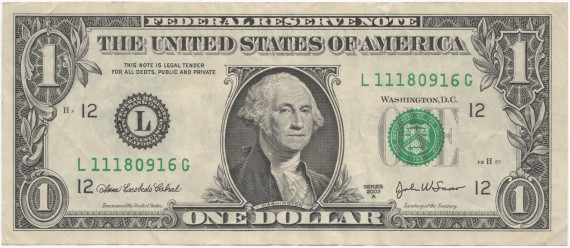

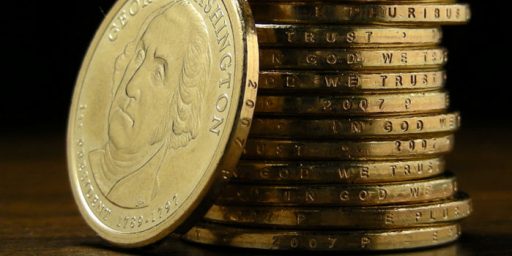
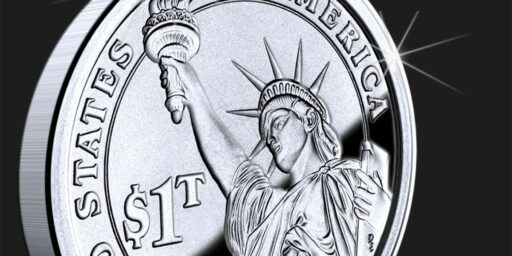
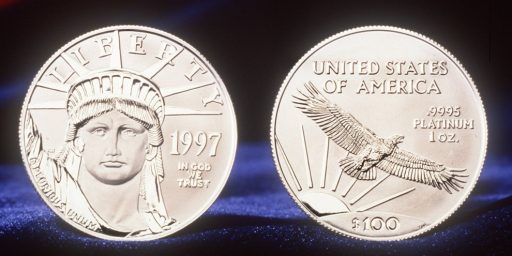
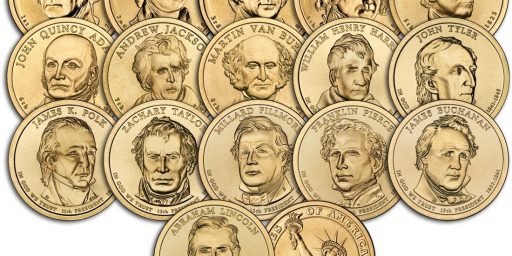
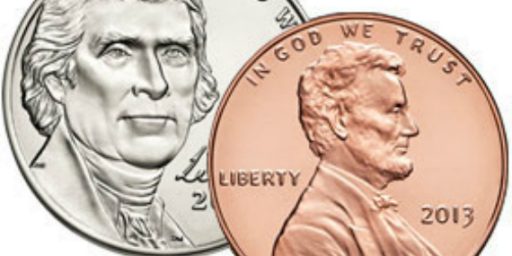
I loved the dollar coins! Whenever I got one, I would keep it for awhile, just to have it, and then would return it to circulation in an effort to try to keep the flow going.
I was surprised when a cashier told me that my dollar coin was the first she had seen in months and that she had heard all the dollar coins were being returned to banks in exchange for dollar bills.
People will use them if they have to.
The biggest losers will be cheapskates who frequent strip bars, but then again they are already some of society’s biggest losers.
@Geek, Esq.: The smart ones will go to a bank branch and stock up.
Greetings:
Well, no one can accuse President Obama and Mr. Bernake of not doing their parts. But, then you weren’t really writing about the dollar’s value now, were you ???
@Geek, Esq.:
Perhaps this would inspire them to become better tippers
99-cent and dollar stores would take major hits if the dollar bill was eliminated. Lots of them are anchor or junior anchor tenants for strip mall shopping centers and such. Which in turn negatively would affect the ability of the owners of those developments to meet their debt service and debt service coverage requirements. Which in turn inevitably would lead to more CRE foreclosures and short sales. Which in turn would put pressure on rents in the retail space. Which in turn would lead to more foreclosures and distressed sales. So on, so forth.
In reference to that quoted article, when a major selling point of a proposal is to save 4.4 billion taxpayer dollars over 30 years we all need to stop and think about it a little more closely and a little more clearly. Forty-four billion dollars in one year is real money, albeit not all that much in the greater scheme of things. But 4.4 billion dollars over 30 years is not even a drop in the bucket; it’s a drop in the Pacific Ocean.
Always beware of the unintended consequences of government actions. And remember that in economics and finance nothing exists in a vacuum.
I think eliminating the bill would be an absolute test of rationality in congress. It is pass or fail.
Again though, “costs more than $1 to produce” is incomplete economic analysis. You need to consider useful life, loss rate, and scrap value.
If a printed dollar had no scrap value, cost $2 to make, and lasted forever, that would be a huge win.
If a penny cost $0.007 to produce, but could be exported to Mexico and sold for $0.011 in scrap, it would be a continuing loss.
@Tsar Nicholas:
That totally fails in economic analysis. Debit cards. Dollar coins. Etc. Etc.
(As an aside, I think my cash purchases have fallen of late. I no longer build up spare change like I used to. Probably because I’m using the credit card (and building REI dividends) for anything over $7 or so.)
@Tsar Nicholas:
Really? Their customer’s habit is come to the stores and purchase only a single item — with cash?
I wonder why they have shopping carts/baskets….who knew?
@Tsar Nicholas: That’s the most ridiculous thing I have ever heard. The last time I was in a Dollar store people were spending $10 – $20 and using debit/credit cards.
@john personna: What a surprise.
But best leave him alone. He’s just looking for new things to be contrary about after the election has passed.
@Ron Beasley: I don’t believe you – in fact that’s probably not even the most ridiculous thing Tsar has said even this week Ron…
@Tony W: I think the election broke him. He’s moving into “auto-downrate like he’s superdestroyer” territory.
The major reason people probably don’t like dollar coins is that they are heavy, comparatively. Split pay for something less than $4 with a $20 bill and chances are high you’ll get handed six or more one dollar bills in change. All that in coins would get mightily heavy quite quickly.
I know that when I clean out my (small) purse at the end of each week I invariably have 1-3 lbs of coins in there. I can just imagine what it would be like if all the dollar bills were coins as well.
@Tony W: And that’s why he’s pushing for a sales tax exemption for dollar stores. And dollar menus. & so on.
I think the more entertaining part of his comment is that he thinks antibiotic-resistant bacteria are going to foreclose on their homes. I guess that happens when their host dies, but I rarely see short sales in that market.
People simply don’t want dollar coins. Carrying change sucks, bills are easier, especially if you’re already carrying higher denomination bills anyway. This is a problem that is already shrinking as we move away from cash with credit and debit cards now, and cell phone tap-to-pay type systems being explored for the future. You can just as easily argue that stamping dollar coins nobody wants is the waste, as there are other programs that run far bigger deficits to focus on first and 4.4 billion over 30 years, which averages to 146 million a year, just isn’t a big deal with yearly deficits and debt measured in trillions.
I’m not against the government imposing some things for the greater good such as raising fuel efficiency standards, but this seems like an unpopular change for small potatoes on something that we should be less reliant on in the future anyway.
Canadian perspective – no one misses the dollar bill.
This topic comes up on OTB about once a year. People will get used to dollar coins. Canadians and Britons got used to it when their national currencies dropped the single denomination bills and issued coins in their place. I much prefer coins for use in vending machines.
@Geek, Esq.: You just trade in the coins for Monopoly money at the door.
Source: I once went to a strip club in Germany, there’s no 1 Euro bill so they had to figure something out.
Amusing aside: the strip club in Germany used to be the base chapel of Bitburg Air Base. Only strip club I’ve ever seen that had stained-glass windows.
@pylon:
Whenever I go to Canada on business, I bring my little boy home some Loonies. He gets a kick out of that.
I also bring home Canadian Kit-Kat bars. Yours are just better than ours for some reason.
In 1994, there was the so called “Plano Real” in Brazil, a general reorganization of the currency. At the time, due to inflation, everyone carried in their pockets a currency divided in the hundreds, so, in practice, no one used coins. A dollar was the equivalent of 2,750 cruzeiros reais, the currency at the time. So, even cheap expenses, like candy, could be bought using bills.
After 1994, it was implemented in the country a new currency, initially meant to be pegged to the dollar. That basically meant that people had, suddenly, to carry coins. No one liked the coins at the time. Everyone complained about getting confused with the coins(That´s why today´s coins each different coin has a unique size and a unique color*:
http://4.bp.blogspot.com/-_f83XHK7nM4/UBFlEFjYw9I/AAAAAAAALCc/0MZ5N4NDNbw/s1600/moedas_moedas_monte_diversas_real.jpg )
But, today, everyone uses these coins, because they have to. I think that the same thing would happen with the one dollar coin.
*-Yes, the Euro has a similar design to coins.
@grumpy realist:
I was just at the market and saw a fit looking person waiting for their SUV’s back hatch to auto-close. So weird that we act like invalids all the time. Even people who might also go to the gym.
Obviously you could give exact change most of the week then … just your choice for speed over reduction in payload.
@Mikey:
Probably it´s because they use real sugar instead of corn syrup.
@Greg:
146 million a year equals (at less than $130 per month per person) 100,000 people on food stamps.
I understand that cutting food stamps has a higher political popularity than cutting coins, but that doesn’t mean its defensible.
(actually, that’s “families” not people)
@Mikey,
Just like the Mexican Coca Cola they sell at Costco. Real cane sugar instead of HFCS here.
@Tsar Nicholas:
Wait, what? Dollar coins can be used to pay for things that cost one dollar, that’s why they’re called “dollar coins”. Why do you think a dollar store wouldn’t accept coins? In Canada, dollar stores are a booming business, even though Canada has dollar coins and not dollar bills.
College students and other people who use laundromat should love dollar coins: you’ll only need a few coins to do a load of laundry instead of saving up a fistful of quarters.
@john personna: Wow, way to put words in my mouth. So everyone who doesn’t want to deal with coins is a conservative who wants to gut food stamps? Complete non-sequitur.
If everything under the sun has to be broken down into a left/right argument, how about this?
For the left: If you argue that conservatives going after PBS/CPB is just politics because it’s not that much money in the scope of the overall budget, why is it different this time? I’m not saying this is politically motivated, I’m saying it’s a similar amount of money.
For the right: You yelled about the government using efficiency standards to force CFLs on people who didn’t want them. This would also be the government forcing something on people that they don’t want.
For the record, I’m a liberal and I do use CFLs anywhere that doesn’t have a weird bulb size or a dimmer. I bought the PBS defense which is why I’m not impressed by this amount of savings. But underneath it all, if we’re being totally honest, I just hate dealing with fucking coins 🙂
@john personna: Wow, way to put words in my mouth. So everyone who doesn’t want to deal with coins is a conservative who wants to gut food stamps? Complete non-sequitur.
If everything under the sun has to be broken down into a left/right argument, how about this?
For the left: If you argue that conservatives going after PBS/CPB is just politics because it’s not that much money in the scope of the overall budget, why is it different this time? I’m not saying this is politically motivated, I’m saying it’s a similar amount of money.
For the right: You yelled about the government using efficiency standards to force CFLs on people who didn’t want them. This would also be the government forcing something on people that they don’t want.
For the record, I’m a liberal and I do use CFLs anywhere that doesn’t have a weird bulb size or a dimmer. I bought the PBS defense which is why I’m not impressed by this amount of savings. But underneath it all, if we’re being totally honest, I just hate dealing with f’ing coins 🙂
NPR’s (gulp!) Planet Money (gulp!) did a story and a podcast on this. They concluded (gulp!) that switching from bills to coins probably wouldn’t save us money even if you do account for seigniorage. (gulp!)
COUGH COUGH COUGH
Sorry, had something caught in my throat.
Wow! Who could have guessed that eliminating the dollar bill would end the entire world?
@Greg:
Wasn’t going for a left right thing, more an example of how the affluent will not make rhe smallest sacrifice.
Coins are sooooo heavy.
(And Canadians are super men and women. Heck I understand children can carry a buck at a young age.)
I HATE carrying change. Not because it’s so heavy that it fatigues me. But because I don’t this huge mass of metal swinging around in my pockets. It is a pain in the butt. I hate carrying change even now, even before you convert all of my $1 bills to coins. That will be just be ridiculous. Every time I’ve gone overseas, it drove me nuts.
If we do go to dollar coins, that will probably become the end of me ever carrying cash ever again. Every transaction will be on cards.
C’mon, Americans don’t like change. It’s not a huge money saver, but I think we would survive if they made the change. I would just request they make it thin. That damn Sacajawea dollar was like a bronze casino chip.
Where to begin? Doug states that there is a political constituency for keeping the dollar bill (which is only made it Texas from materials made in MA) but neglects the heavy political constituency for switching to coins (there are mints in a number of states). Study after study shows that the economic benefits of switching to dollar coins are a) minimal, b) requires a large upfront investment and c) only accumulate if we assume the coins are in circulation for decades. In my short lifetime the metal content of various coins have been changed what, a dozen times? They became worth more as scrap metal. Almost all of the valuable ones are now out of circulation and melted down. Why would this trend stop?
I think most people just assume coins are a better deal. If that is true, it is at the margins and there are investments that would return significantly better, dollar for dollar. (heh heh)
That’s one way to keep a business alive in Massachusetts, give it a monopoly and protect it from closure
@datechguy: Several times since Reagan, some Senator with a paper mill in his state goes all bonkers about free enterprise and says that it’s time Crane competes on an equal footing and dagnabbit, they better open this up to competition. Considering that one of the most important counterfeit prevention measures is the paper our currency is printed on, encouraging more people to manufacture that paper might be considered risky. Doesn’t matter though, since Crane simply resubmits their standard contract and the other paper mills… end up giving up without a bid, wondering how the heck Crane can produce it for so little and still make a profit.
Crane’s not telling anyone, and the one time I went into the mill I was given a color coded badge. On the floor were a bunch of lines painted in various colors and I was informed that if I ever set a toe over the color that corresponded to my badge I would be escorted out the door immediately and never allowed to set foot in it again. Crane doesn’t hold patents, they hold trade secrets, which they have kept since before there was a US government.
@Greg:
1-) PBS/NPR are a more complicated issue. Public broadcasting is not a waste of money. It´s not like the government is throwing away money, whether the amount of it.
Public broadcasting produces useful information and educational programs that the Free Market can´t produce. Besides that, there is the issue of soft power. That old commie, Margaret Thatcher, used to argue that the BBC World Service was worth every penny. And the BBC World Service means putting antennas all over the world. On the other hand, that explains the popularity of London among the elites of many countries where the BBC World Service is popular.
One could argue that the uS should expend more, not less, with Public Broadcasting.
2-) Coins are not only a matter of cost. There is also issues like vending machines, spare change, etc.
Well you know, if coins are too hard, is there anything easier?
We have a lot of problems boys. If we wait around for them to be easy it might take some time.
As a historical note:
That 1862 dollar, the smallest denomination of paper money, would be worth $22.20 in 2011.
So basically a $1 was a $20. But whiners today think that we should ride the curve down forever, because we are such wimps, and carrying the equivalent of a five cent bill is no big deal.
@john personna:
Yeah, I don’t get it. I go to Germany, I go to Canada, neither place seems to have any difficulty not having a paper note of their lowest denomination. And in Germany they still do most everything with cash–you don’t generally see people pulling out plastic for day-to-day purchases like we do here. They just carry around a wallet that has a pocket for change.
Speaking of plastic, I use the debit card for EVERYTHING. It’s unusual for me to have more than five dollars in cash in my wallet, and sometimes I have none.
Their main reasoning behind this is that they know in two more years there will not be enough one’s around for everyone to pay for a loaf of bread.
@Whitfield:
For most of American history you could buy a loaf of bread for just a few coins.
That is what people are absurdly afraid of.
@john personna: The Brazilian experience shows that people may complain at the beginning, but they will get used to it.
@Andre Kenji:
I can’t get over the weird exceptionalism.
Other people can carry coins. We can’t. They’re too heavy. We’re number one!
When I went to Wales earlier this year we used 1 pound coins and it was not a problem adjusting.
(It was harder adjusting to the different sizes vs coin values, and the huge 2 pence coin)